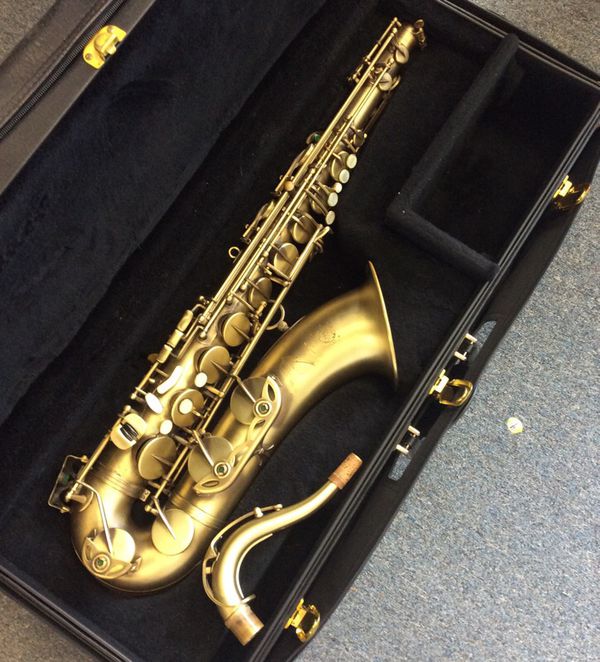

Another variation from the original Balanced and the 36 is the addition of a high F-sharp key. I didn’t notice much difference, however, in the way the two horns felt as I played them. According to Selmer, the keys are lighter weight than those of the Reference 54. It doesn’t feel much like a Balanced Action.

One big difference between the Balanced and this horn is the key work.

The Reference 36 is Selmer’s tribute to the Balanced Action. There is no engraving anywhere on the horn except for the Selmer logo on the bell. It is then brushed to remove most of the black color (a little is left in the nooks and crannies around posts and such places) and then coated with a matte lacquer that makes the horn look something like an old VI without its lacquer. The horn is put through an oxidation process that turns the body and keys black. The lacquer is unique and part of a new process that Selmer is using only on this model in order to give it a vintage look. It projects well, though, and is much closer to the old Selmers than any horn I’ve played. The sound of the horn is clear although slightly less resonant than both of my older Selmers. The Reference 54’s biggest improvement over the VI is a remarkably even scale and excellent intonation through the entire range, especially in the high register, where it is aided by the addition of a high F-sharp key. The palm keys are low, however, and feel more like a Balanced Action. The keys on the body of the horn and the spatulas for the little fingers on both hands feel very close to my Mark VI. This is probably due to the more extensive key work on the new horn that includes extra supports for the longer rods and thicker metal for the keys. The Reference 54 is noticeably heavier than the Mark VI. Since both new instruments were made to appeal to players who enjoy playing the Mark VI or Balanced Action, I thought it fair to place the horns up to my own tenors, a Balanced Action (serial #50K) and a Mark VI (serial #159K) and play all of them back-to-back over the course of about a week. Fortunately, Selmer has somehow found the magic formula again and come out with two top-notch instruments.

True or not, the stories were so fabulous it seemed virtually impossible to reproduce the classic horns. Another version was that the metal came from the spent casings of artillery shells fired from tanks during the war that were then recycled into saxophones. One story has the Selmer Company buying church bells that were confiscated during World War II and then using that metal, tempered by years of being rung by Quasimodo, to make the arcane blend of alloys that became the Mark VI. Since 1974, when the Mark VI was discontinued, a mythology has grown around the classic horns involving everything from the hoarding of horns by dealers in Japan to the formulation of complicated theories surrounding the original metal used by Selmer to make the VIs. The idea behind the Reference tenors is that they have the great tone quality of the Mark VI and Balanced Action but they take advantage of modern improvements in intonation and key work.
SELMER REFERENCE 54 DIMENSION SERIES
These horns are neither reproductions of the classic models nor are they meant to replace Selmer’s top-of-the-line saxophone, the Series III. Often the wail has sounded more like: “Why won’t Selmer just make the Mark VI again!” Selmer has responded to the laments by bringing out two new tenors, the Reference 54 and the Reference 36, that are made in the spirit of the Mark VI and the Balanced Action, respectively. Saxophonists have been wailing for years, and not always on a blues or ballad.


 0 kommentar(er)
0 kommentar(er)
